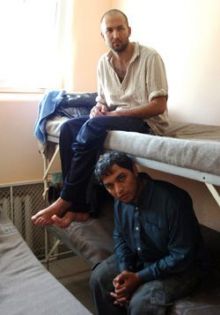According to Ukraine’s green- capped state border guards, our country is becoming increasingly popular. Since the beginning of 2008, 24 million people and 5.3 million vehicles have crossed our borders. Unfortunately, illegal migrants are among the first people to take advantage of our country’s unique transit status. During one four-month period this year Ukrainian border guards detained many uninvited guests: 1,009 illegal migrants — for illegal crossing our state borders — and 641 — for violating the regulations governing stays in the country.
Ukrainian checkpoints refused entry to 8,986 potential illegal migrants. The lion’s share of these illegal "tourists" is represented by citizens of the CIS countries, say the officials of the Ukrainian State Border Guard Service. However, many illegal migrants come from Southeastern Asia and Africa. At the moment, 19 migrants from Somalia, Afghanistan, and Bangladesh are getting used to Ukrainian porridge at the Temporary Detention Center (PTT) of the Chernihiv Border Unit.
This past May four men wearing winter jackets and sheepskin coats were taking a walk in the inner courtyard of the center. Since they were detained in January, these detainees were still wearing their winter clothing. Nobody can say how long they will remain here. An illegal migrant cannot be released until he is identified.
"Identifying a migrant is a lengthy and complicated process," said Col. Yurii Sambor, the head of the Chernihiv border unit, "especially when the nearest embassy of the uninvited guest’s homeland is located somewhere in Moscow."
The diplomatic representatives of a number of states are reluctant to help Ukrainian border guards. This is no surprise: Somalia, for example, still does not have a government because there is a civil war going on.
Most detainees immediately ask for refugee status in Ukraine — sincerely or not. If the migration service accepts their documents for consideration, the uninvited guests are released from the PTT. Many asylum seekers are later caught on Ukraine’s western border, trying to enter the countries of the European Union illegally. But to a resident of Mogadishu or Jalalabad, Ukraine may look absolutely suitable as a place of residence.
For Bilal, a 20-year-old Afghani, the road to Ukraine began at the Cherkizovsky Market in Moscow, where he worked as a vendor for two years. In that time he picked up some Russian, including street slang. "My friend said that it is better in Ukraine than in Russia: the militia does not pick on you," Bilal recounted.
The young man believed his friend and soon joined a group of people like him, seeking a better life. While attempting to cross the Russian-Ukrainian border, he was caught red-handed by Ukrainian border guards. Now Bilal is hoping to obtain refugee status and is waiting for a decision from the migration service. "But wages in Ukraine are miserable," I said, trying to dissuade him. "But everything is cheap here," the knowledgeable Afghani replied. "It costs at least 1,000 dollars to rent a one-room apartment in Moscow, and here, I’ve heard, you can find one for 100 or 200 dollars."
Bilal is not the only one concerned about the availability of apartments. The senior officer who was on duty at the PTT, Warrant Officer Yurii Suprunenko, has served on the border for 22 years. He earns 2,200 hryvnias a month, including benefits. This salary is not enough for a family with three children to live on, especially if it does not have its own place. Suprunenko pays 150 dollars a month to rent a one-room apartment in Chernihiv.
The isolator is maintained with funds from the budget of the State Border Guard Service. Detainees are fed a reduced quota of army rations. The menu includes porridge, potatoes, fish, tea, and stewed fruit.
There are 21 places in the PTT. All newcomers undergo medical exams, and if anyone requires medical attention, he is placed in the local hospital. It is a good thing that there have been few dangerous cases. "Last year we detained a citizen of India who had typhoid fever," explained Captain Andrii Hordieiev, the head of the PTT. "We had to place him under guard in an isolator."
We talked to 27-year-old Saem from Bangladesh in the small yard where the detainees are let out for walks every day. "The terrorists in my homeland give us no peace," he explained. "My mother and sister were killed." He refuses to return to his troubled homeland, so he wrote out an application to the Chernihiv Migration Service.
Saem paid more than 9,000 dollars for his trip to Ukraine. "In order to get to Moscow I had to pay 5,000 dollars. I lived there for a month without leaving my apartment. For another 2,000 dollars they promised to provide me with documents and bring me to Ukraine. They took my money, but I never saw the documents," he said.
In the last 10 years the border guards of the Chernihiv unit have detained 3,745 illegal migrants. The border service is aware of at least six organized crime groups that transport illegal migrants. "Most of them operate along a stretch of 183 km along the Ukrainian-Russian border," the head of the border guard unit said. "Belarusian laws are stricter, so they have fewer problems there. Even in the European Union the Belarusian border is considered to be very safe."
Most illegal Asian migrants come to Ukraine via Russia. Yet Russian border guards refuse to take back migrants who are caught at the Russian-Ukrainian border. "In the three and a half years that I have been at this post we managed to send back only one group of 18 people, who were detained as a result of joint operations," Col. Sambor said.
This year the Chernihiv border guards sent only one Afghani back to the Russian Federation, and only because they found indisputable proof of his Russian transit in his pocket: a passport with a Russian visa and a note about his arrival at Sheremetievo Airport.
Russia is doing a brisk business selling visas to countries with a high migration risk and has no obligations vis-a-vis Ukraine to send illegal migrants back across the border. An agreement on readmission has been signed to ease the work of Ukrainian border guards. The document signed by Kyiv and Moscow obliges both sides to accept uninvited guests from third-party countries once they come from their territory. But Moscow is absolutely not interested in ratifying this agreement. So, like before, all expenses connected to the identification of migrants and determination of their further status rest are being shouldered by Ukrainian taxpayers.








